Mark Anthony Neal's Blog, page 814
July 2, 2014
Escape From Zombie Nation: A Musician Weighs in on Contemporary Black Music #TheStateofBlackMusic
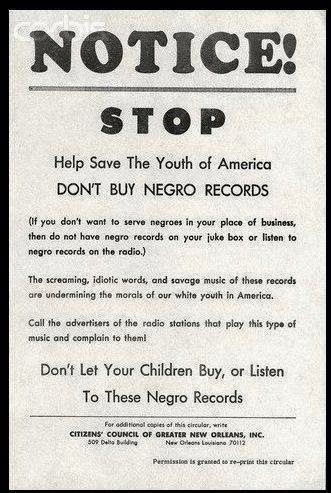 #TheStateofBlackMusic
#TheStateofBlackMusic
Escape From Zombie Nation by Bill Banfield | special to NewBlackMan (in Exile)
“Trane was our flag. But there were other, younger forces…There was a newness, defiance…laid out in their music…politically and creatively, it was all connected…It was if the music was leading us." –The Autobiography of Leroi Jones by Amiri Baraka
I’ve been concerned about the slip in the quality of mainstream popular music artists and culture. Commercial Hip-Hop song, style and imagery, as well as much of Black popular music culture has little interest, it seems, in telling the people who they are, where they are and who they can become. Baraka's idea was that the music was a powerful banner for what the people believed and hoped in.
Today, Black images and identities are teased, tortured and torched at the public stake; no place is this more evident than in contemporary popular music. I wonder if looking back on this we will remember this period of black pop artists as the "musical walking dead"? We have slipped into a Zombie Nation on this issue.
During the lives of Black Americans from the 1940s through 1990s, “the musician community” provided swing, gospel, bebop, r&b, free jazz, soul, ( Motown, Stax, Philly Soul), soul jazz, fusion, Reggae, funk, hip hop, and urban contemporary. All very different types of artistry but from the same root, people and conditions.
Earlier generations passed on and pushed an "aspirational mindset" in music—to aspire beyond, toward a quality life mode, with hard work and accomplishment that buffered against disappointment, failure and shut doors. The songs were high inspiration, had a redemptive quality, a prescription for living and imbued with community value. Song was a part of the social medicine with examples like "Ain't No Stopping us Now" and "Keep Your Head To The Sky."
Many my age, have argued that it appears that today's generation has little of a connected, sustainable, political, social, and cultural agenda. Or that some of the progressive forward gains of the Civil Rights Generation, are today being systematically and culturally undermined by negative political forces as well as, complacency and a sense of apathy.
Given current trends in mainstream radio, the media industry and digital culture, many of today's artists are not being supported in moving in their own new artistic individual creative directions. There's nothing that really stands out, as memorable about much of today’s commercial music because everything is pre-fabricated, and produced for the artist. Too much of mainstream contemporary music making has become an "easy bake oven form, because of fast fancy technology and industry interests in only a common sold, commodified product.
Even the Internet—and the democratic access it has provided—may in the long run be cheapening the value of our exchanges and representations. We have lowered the value of many things because they are mostly free.
It's time to work on a new way of thinking. Cultural expressions like music resonates in human-spiritual zones, and belong to the people, not corporations. People make music to respond to the way they move in the world; it's not computer or YouTube generated.
Wouldn't it be something though if our churches, synagogues, temples and communities with support of local radio would bring folks together to create sustainable programs of community focused news and information, arts, education and political talks? We could create "community theaters," an idea Guy Ramsey writes about in his book Race Music where folks "combine and form living photographs, rich pools of experiences and a cultural poetics."
So what now?
I have three suggestions:
1. A re-tune and re-boot, of the system. Today’s music programming is mostly governed by marketing sales ploys, devised-based solely on business needs to feed the market and profit from topical style and fashion surges. Change that agenda.
2. Young musicians need to be able to feel encouraged to make music that makes their soul sing and touch people to give human joy not to chase constructed toys and plots and ploys.
3. Our focus needs to be shifted to the music not the market, and from consumerism to community care and concern.
The market follows the dictates and demands of the art, not the other way around. There needs to be venues and media that illustrate what musicians and artists really talk about: their love in making music because of music.
This is the information, the story the public needs to see and hear. And the beat and the rest will all follow, and that's how we move from cultural Zombie Nation to cultural theaters and working together again to create a better living culture than we have right now.
***
Bill Banfield is a composer, recording artist, Professor, director of Africana Studies Music and Society/ Center, at the Berklee School of Music, Boston. He is the author of several books including, Representing Black Music Culture: Then, Now, and When Again? and Cultural Codes , and the host of ACC with Bill Banfield, a part of the Tavis Smiley radio network.
Published on July 02, 2014 19:10
Escape From Zombie Nation: A Musician Weighs in on Contemporary Black Music
 Escape From Zombie Nation
by Bill Banfield | special to NewBlackMan (in Exile)
Escape From Zombie Nation
by Bill Banfield | special to NewBlackMan (in Exile) “Trane was our flag. But there were other, younger forces…There was a newness, defiance…laid out in their music…politically and creatively, it was all connected…It was if the music was leading us." –The Autobiography of Leroi Jones by Amiri Baraka
I’ve been concerned about the slip in the quality of mainstream popular music artists and culture. Commercial Hip-Hop song, style and imagery, as well as much of Black popular music culture has little interest, it seems, in telling the people who they are, where they are and who they can become. Baraka's idea was that the music was a powerful banner for what the people believed and hoped in.
Today, Black images and identities are teased, tortured and torched at the public stake; no place is this more evident than in contemporary popular music. I wonder if looking back on this we will remember this period of black pop artists as the "musical walking dead"? We have slipped into a Zombie Nation on this issue.
During the lives of Black Americans from the 1940s through 1990s, “the musician community” provided swing, gospel, bebop, r&b, free jazz, soul, ( Motown, Stax, Philly Soul), soul jazz, fusion, Reggae, funk, hip hop, and urban contemporary. All very different types of artistry but from the same root, people and conditions.
Earlier generations passed on and pushed an "aspirational mindset" in music—to aspire beyond, toward a quality life mode, with hard work and accomplishment that buffered against disappointment, failure and shut doors. The songs were high inspiration, had a redemptive quality, a prescription for living and imbued with community value. Song was a part of the social medicine with examples like "Ain't No Stopping us Now" and "Keep Your Head To The Sky."
Many my age, have argued that it appears that today's generation has little of a connected, sustainable, political, social, and cultural agenda. Or that some of the progressive forward gains of the Civil Rights Generation, are today being systematically and culturally undermined by negative political forces as well as, complacency and a sense of apathy.
Given current trends in mainstream radio, the media industry and digital culture, many of today's artists are not being supported in moving in their own new artistic individual creative directions. There's nothing that really stands out, as memorable about much of today’s commercial music because everything is pre-fabricated, and produced for the artist. Too much of mainstream contemporary music making has become an "easy bake oven form, because of fast fancy technology and industry interests in only a common sold, commodified product.
Even the Internet—and the democratic access it has provided—may in the long run be cheapening the value of our exchanges and representations. We have lowered the value of many things because they are mostly free.
It's time to work on a new way of thinking. Cultural expressions like music resonates in human-spiritual zones, and belong to the people, not corporations. People make music to respond to the way they move in the world; it's not computer or YouTube generated.
Wouldn't it be something though if our churches, synagogues, temples and communities with support of local radio would bring folks together to create sustainable programs of community focused news and information, arts, education and political talks? We could create "community theaters," an idea Guy Ramsey writes about in his book Race Music where folks "combine and form living photographs, rich pools of experiences and a cultural poetics."
So what now?
I have three suggestions:
1. A re-tune and re-boot, of the system. Today’s music programming is mostly governed by marketing sales ploys, devised-based solely on business needs to feed the market and profit from topical style and fashion surges. Change that agenda.
2. Young musicians need to be able to feel encouraged to make music that makes their soul sing and touch people to give human joy not to chase constructed toys and plots and ploys.
3. Our focus needs to be shifted to the music not the market, and from consumerism to community care and concern.
The market follows the dictates and demands of the art, not the other way around. There needs to be venues and media that illustrate what musicians and artists really talk about: their love in making music because of music.
This is the information, the story the public needs to see and hear. And the beat and the rest will all follow, and that's how we move from cultural Zombie Nation to cultural theaters and working together again to create a better living culture than we have right now.
***
Bill Banfield is a composer, recording artist, Professor, director of Africana Studies Music and Society/ Center, at the Berklee School of Music, Boston. He is the author of several books including, Representing Black Music Culture: Then, Now, and When Again? and Cultural Codes , and the host of ACC with Bill Banfield, a part of the Tavis Smiley radio network.
Published on July 02, 2014 19:10
Learning How To Be A Man, From Mom
Published on July 02, 2014 18:50
NPR's Tiny Desk Concert: Mali Music

Mali Music--Kortney Jamaal Pollard--sings tracks from his new album Mali Is... (RCA) for NPR's Tiny Desk Concert.
Published on July 02, 2014 09:29
#NeverLovedUs--New Video from Jasiri X
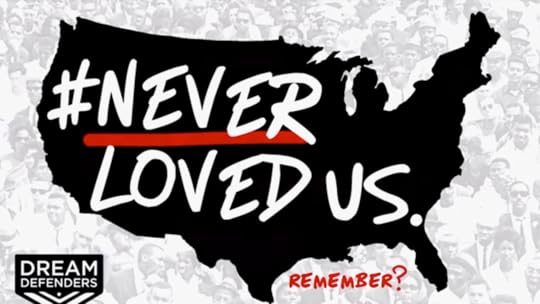
"Inspired by the Dream Defenders #neverlovedus campaign, Jasiri X breaks down recent cases of American injustice over Drake's "Worst Behavior" instrumental. Download #NeverLovedUs at http://jasirix.bandcamp.com/ "
LYRICS
Every time I ride around hearing siren sounds
Some crooked ass cop might fire rounds
And the shot might lie me down
Somebody got to tell my mom they paralyzed her child
We need Malcolm with the M-1 and then some
Booby Seale with the shotty filled get some
Man we need Farrakhan security
For every Black child that made it outta puberty
Black leather jacket black shotgun Huey P
Bet you'll see them bullets fly nigga duty free
Before I'm crucified like a cross on ya jewelry
By crooked police in the hood on a shooting spree
Ask Leon almost had to read his eulogy
Shot five times by the cops so brutally
In a wheelchair and still getting all the scrutiny
Even though America truly be acting on her worse behavior
Did we pay more attention to Michael's new Jordan's
Than the outcome of Michael shooting Jordan
For protection do I need a rifle when performing
If we start turning up will they try to murder us
Dangerous black kids we ain't welcome in suburbia
All we want is justice and equality the nerve of us
Still deny services criminalized by journalist
Turn the other cheek and get killed by christen conservatives
Mass incarcerated in prison is where they herding us
Calling us thugs you see em try and Richard Sherman us
They act like aint nothing worst than us
But be the first to bust last to get searched and cuffed
We ain't forget you use to purchase us
Left us swinging from the trees or you burn us up
Now we organized and ready to stick the merchants up
So give them purses up
For you see us on our worst behavior
Andy Lopez was only 13
7 shots from a sheriff left him in the dirt leaned
To his mother and his father had to be the worse scene
Do you know what hurt means
When you see your child dead and his shirt seems
Liquid from the thickness of the blood still squirting
Dear God can you answer me 1st thing
Can you wipe the earth clean
Of all the hatred in this world and let the church sing
Amen turn to today's hymn whose gonna save them
Cause in North Carolina Jesus they slayed him
In the back of a cop car cuffed they sprayed him
Then told us that he killed his self like satan
So when you see me on MSNBC
Or on Huff Post Live and I bust 45s
Until I see America shut both eyes
Call the hearse to claim her on my worst behavior
Published on July 02, 2014 09:07
July 1, 2014
Artist Kara Walker Talks Sugar, Slavery and Her Giant Sphinx on CBS This Morning
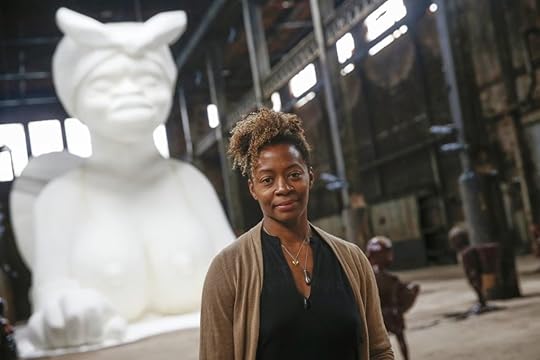
On CBS this Morning, artist Kara Walker discusses her new installation A Subtlety, or the Marvelous Sugar Baby with Michelle Miller. Additional commentary from Henry Louis Gates, Jr..
Published on July 01, 2014 12:22
Net Neutrality: Is the Internet a Public Utility? (a Primer)
 PBS Digital Studios | The Idea Channel
PBS Digital Studios | The Idea Channel
Is the internet a public utility? No. Should it be? That's an interesting question. The Internet, as we've said many a time, is a glorious series of tubes, and Internet Service Providers (ISPs) sell us access to those tubes. But the FCC is considering a new Two Tiered system, in which some companies could pay ISPs for faster delivery. This topic (aka Net Neutrality) has made us think about the important role the internet plays in our lives. Is internet access so important that it should be classified as a public utility or common carrier, like water & electricity, or public buses and subways?
Published on July 01, 2014 06:32
The Case for Reparations Still Remains in African-American Community
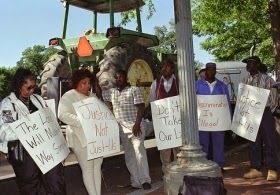 WBEZ
WBEZ
Atlantic writer and editor Ta-Nehisi Coates article The Case for Reparations has re-ignited the reparations debate. Last night, WBEZ’s South Side bureau hosted a community forum on the subject featuring Kamm Howard of The National Coalition of Blacks for Reparations in America. WBEZ’s Natalie Moore fills us in on the forum, and we’ll be joined by Mr. Howard and Dr. William "Sandy" Darity of Duke University, a renowned scholar in the field of reparations and their economic components.
Published on July 01, 2014 06:19
June 30, 2014
Statement from The Planned Parenthood Action Fund Regarding Supreme Court Ruling Against American Woman & Families
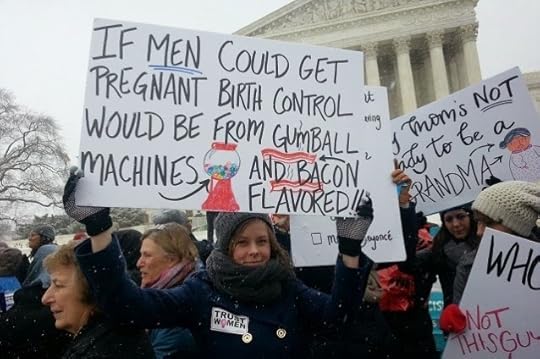 Contact: Planned Parenthood Action Fund Media Office, 212-261-4433For Immediate Release: 06.30.14Ruling leaves birth control benefit in place for millions of women but gives some employers the new right to deny coverage WASHINGTON, DC — Planned Parenthood Action Fund condemned today’s ruling by the Supreme Court that some for-profit private corporations, such as the arts and crafts chain Hobby Lobby, can deny coverage of birth control to their employees, for no reason other than the personal religious beliefs of the corporation’s owners. Following is a statement from Cecile Richards, president of Planned Parenthood Action Fund:“Today, the Supreme Court ruled against American women and families, giving bosses the right to discriminate against women and deny their employees access to birth control coverage. This is a deeply disappointing and troubling ruling that will prevent some women, especially those working hourly-wage jobs and struggling to make ends meet, from getting birth control.“This ruling does not strike down the Affordable Care Act’s birth control benefit. Today, more than 30 million women are eligible for birth control with no co-pay thanks to this benefit, and the vast majority of them will not be affected by this ruling. But for those who are affected, this ruling will have real consequences.“It’s unbelievable that in 2014, we’re still fighting about whether women should have access to birth control. Some politicians want to get rid of the birth control benefit entirely and take away coverage from millions of women. To the majority of Americans, birth control is not a controversial issue. Birth control is basic health care – and it’s only a ‘social issue’ if you’ve never had to pay for it.“We hope most businesses will do the right thing and let women make their own health care decisions. We urge Congress to act and protect women’s access to birth control, regardless of the personal views of their employer.”BACKGROUNDAfter decades of discriminatory coverage by insurance companies, the birth control benefit requires all insurance policies to cover birth control with no out-of-pocket cost to women — rightly categorizing birth control as part of women’s basic preventive care. According to the Department of Health and Human Services, 30 million women nationally are already eligible for this benefit. When the law is fully implemented, 47 million women nationally will have access to no-copay birth control thanks to the Affordable Care Act.Thanks to the birth control benefit, women already have saved $483 million in the last year alone. Studies also show that women who receive birth control with no co-pay or at a reduced cost are able to avoid more than two million unplanned pregnancies each year, which also reduces the need for abortion. It’s not surprising that the public overwhelmingly supports the birth control benefit by a nearly two-to-one margin. Planned Parenthood has several resources, including a white paper and animated whiteboard video that provide background on the birth control benefit and what’s at stake with the Supreme Court case. A “Birth Control: We All Benefit” booklet includes 50 inspiring stories from women across the United States.Birth control is tremendously important to women for all kinds of reasons, including the need to control certain medical conditions and to plan our families. Under the birth control benefit, women have access to this important preventive care at no cost.The wide availability of birth control has been an enormous benefit for countless women and their families — enabling them to support themselves financially, complete their education, and plan their families and have children when they’re ready.Virtually all (99 percent) American women between the ages of 15 and 44 who are sexually active have used birth control at some time.A 2010 survey found that more than a third of female voters have struggled to afford prescription birth control at some point in their lives, and as a result, used birth control inconsistently. This isn’t surprising considering copays for birth control pills typically range between $15 and $50 per month — up to $600 per year. Other methods, such as IUDs, can cost several hundred dollars, even with health insurance. For the first time, under the birth control benefit, IUDs are now fully covered by insurance companies without additional out-of-pocket expense.For many women, birth control is used for a host of health care reasons. According to the Guttmacher Institute, 58 percent of birth control pill users cite health benefits as a contributing factor for using the birth control pill, including treating endometriosis, menstrual pain, and menstrual regulation.# # #Planned Parenthood Action Fund is an independent, nonpartisan, not-for-profit membership organization formed as the advocacy and political arm of Planned Parenthood Federation of America. The Action Fund engages in educational and electoral activity, including voter education, grassroots organizing, and legislative advocacy.
Contact: Planned Parenthood Action Fund Media Office, 212-261-4433For Immediate Release: 06.30.14Ruling leaves birth control benefit in place for millions of women but gives some employers the new right to deny coverage WASHINGTON, DC — Planned Parenthood Action Fund condemned today’s ruling by the Supreme Court that some for-profit private corporations, such as the arts and crafts chain Hobby Lobby, can deny coverage of birth control to their employees, for no reason other than the personal religious beliefs of the corporation’s owners. Following is a statement from Cecile Richards, president of Planned Parenthood Action Fund:“Today, the Supreme Court ruled against American women and families, giving bosses the right to discriminate against women and deny their employees access to birth control coverage. This is a deeply disappointing and troubling ruling that will prevent some women, especially those working hourly-wage jobs and struggling to make ends meet, from getting birth control.“This ruling does not strike down the Affordable Care Act’s birth control benefit. Today, more than 30 million women are eligible for birth control with no co-pay thanks to this benefit, and the vast majority of them will not be affected by this ruling. But for those who are affected, this ruling will have real consequences.“It’s unbelievable that in 2014, we’re still fighting about whether women should have access to birth control. Some politicians want to get rid of the birth control benefit entirely and take away coverage from millions of women. To the majority of Americans, birth control is not a controversial issue. Birth control is basic health care – and it’s only a ‘social issue’ if you’ve never had to pay for it.“We hope most businesses will do the right thing and let women make their own health care decisions. We urge Congress to act and protect women’s access to birth control, regardless of the personal views of their employer.”BACKGROUNDAfter decades of discriminatory coverage by insurance companies, the birth control benefit requires all insurance policies to cover birth control with no out-of-pocket cost to women — rightly categorizing birth control as part of women’s basic preventive care. According to the Department of Health and Human Services, 30 million women nationally are already eligible for this benefit. When the law is fully implemented, 47 million women nationally will have access to no-copay birth control thanks to the Affordable Care Act.Thanks to the birth control benefit, women already have saved $483 million in the last year alone. Studies also show that women who receive birth control with no co-pay or at a reduced cost are able to avoid more than two million unplanned pregnancies each year, which also reduces the need for abortion. It’s not surprising that the public overwhelmingly supports the birth control benefit by a nearly two-to-one margin. Planned Parenthood has several resources, including a white paper and animated whiteboard video that provide background on the birth control benefit and what’s at stake with the Supreme Court case. A “Birth Control: We All Benefit” booklet includes 50 inspiring stories from women across the United States.Birth control is tremendously important to women for all kinds of reasons, including the need to control certain medical conditions and to plan our families. Under the birth control benefit, women have access to this important preventive care at no cost.The wide availability of birth control has been an enormous benefit for countless women and their families — enabling them to support themselves financially, complete their education, and plan their families and have children when they’re ready.Virtually all (99 percent) American women between the ages of 15 and 44 who are sexually active have used birth control at some time.A 2010 survey found that more than a third of female voters have struggled to afford prescription birth control at some point in their lives, and as a result, used birth control inconsistently. This isn’t surprising considering copays for birth control pills typically range between $15 and $50 per month — up to $600 per year. Other methods, such as IUDs, can cost several hundred dollars, even with health insurance. For the first time, under the birth control benefit, IUDs are now fully covered by insurance companies without additional out-of-pocket expense.For many women, birth control is used for a host of health care reasons. According to the Guttmacher Institute, 58 percent of birth control pill users cite health benefits as a contributing factor for using the birth control pill, including treating endometriosis, menstrual pain, and menstrual regulation.# # #Planned Parenthood Action Fund is an independent, nonpartisan, not-for-profit membership organization formed as the advocacy and political arm of Planned Parenthood Federation of America. The Action Fund engages in educational and electoral activity, including voter education, grassroots organizing, and legislative advocacy.
Published on June 30, 2014 15:27
'Finding Fela' -- Official Trailer (dir. Alex Gibney)
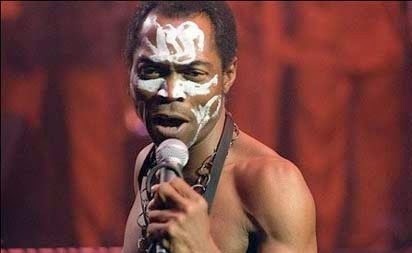 KinoLorber
KinoLorber
Alex Gibney's Finding Fela (2014) is a sweeping portrait of the artist as guerilla warrior. Set to the insistent groove of Nigerian superstar Fela Kuti's revolutionary Afrobeat sound, the remarkable story of one man's courageous stand against a corrupt and dictatorial government gives testament to the transformative power of music as a force of social and political unification.
Opens at New York's IFC Center on August 1, 2014. For additional dates, visit www.FindingFela.com.
Published on June 30, 2014 11:51
Mark Anthony Neal's Blog
- Mark Anthony Neal's profile
- 30 followers
Mark Anthony Neal isn't a Goodreads Author
(yet),
but they
do have a blog,
so here are some recent posts imported from
their feed.




